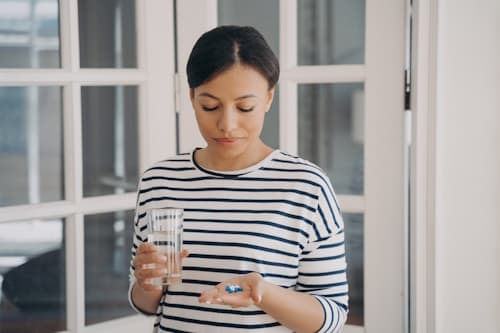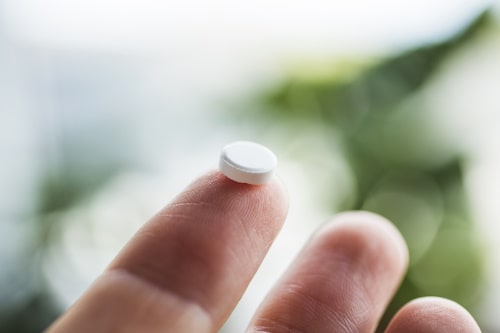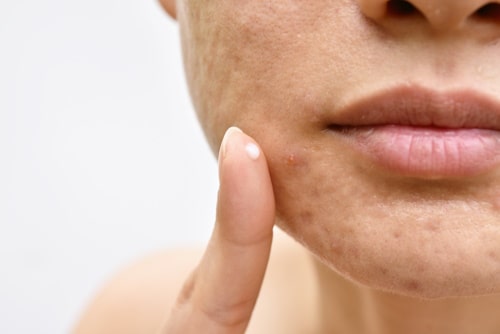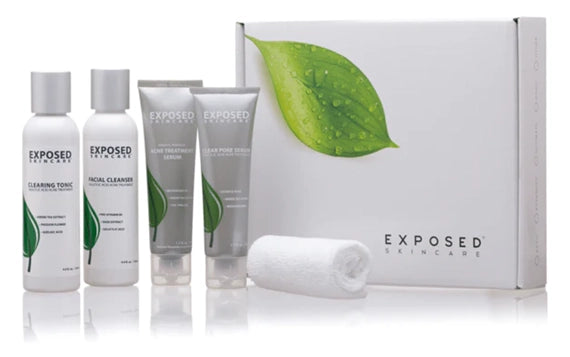One medication often considered for treating fungal acne is Fluconazole, an oral antifungal. But before you jump on the fluconazole bandwagon, you should consider some crucial points.
This article lists five reasons fluconazole for fungal acne might not be your best option. It also introduces alternative fungal acne treatments you can try.
Also read: How to choose the best acne treatment
Biggest Take-Aways:
- Fungal acne is often misdiagnosed as acne vulgaris, leading to ineffective treatments.
- You must accurately identify fungal acne to properly treat it, as it requires a different approach than regular acne.
- Using the wrong treatment for fungal acne can exacerbate the condition.
- Exposed Skin Care offers a comprehensive solution for treating fungal and regular acne, tackling root causes and symptoms effectively.

What Is Fungal Acne?
Fungal acne, scientifically known as Malassezia or Pityrosporum folliculitis, is a type of acne caused by an overgrowth of yeast, particularly Malassezia yeast, on your skin.
Unlike bacterial acne, this yeast thrives in the hair follicles, leading to itchy, small, uniform pimples on your face or body. While the term "acne" is often used, fungal acne isn't the same as traditional acne caused by bacteria on the skin.
How is Fungal Acne Diagnosed?
Diagnosing fungal acne can be tricky since it often mimics the symptoms of typical acne. However, it's essential to identify fungal acne to prevent mistreatment, which can make the infection worse.
Fungal acne typically occurs in areas ripe for yeast growth, like oily skin zones. The symptoms of fungal acne often include itchy, inflamed pimples, which differ from bacterial acne, which is not usually itchy.
What is Fluconazole?
Fluconazole is an oral antifungal medication commonly used to treat yeast infections, including mouth, throat, and genital area. Because it's an antifungal, some may assume that fluconazole is the right choice for fungal acne treatment. However, this might not be the case for everyone.
How Does Fluconazole Work?
The drug reduces the amount of yeast and fungi in the body, effectively treating various fungal infections. But when it comes to fungal acne, fluconazole might not be the most effective treatment option for several reasons, which we will discuss below.

5 Reasons Not to Use Fluconazole for Fungal Acne
Before diving into the world of oral antifungals, it's crucial to understand why fluconazole for fungal acne might not be the best course of action.
It's a Systemic Treatment
Oral fluconazole affects the entire body system, unlike topical treatments targeting the area where fungal acne occurs. While severe cases of fungal acne may require a more systemic approach, many cases can be adequately managed with topical treatments, reducing the risk of potential side effects of oral medications.
Resistance Development
Yeast can develop resistance to antifungal medications like fluconazole, rendering the treatment ineffective over time. The yeast responsible for fungal acne, Malassezia, may become resistant, requiring stronger medication or different treatment options in the long run.
Not Designed for Skin Surface Treatment
Fluconazole is generally not formulated for treating yeast on the skin surface, making it less effective in tackling the hair follicles where fungal acne often develops. Topical antifungal creams and shampoos may be more apt for this purpose.
Side Effects and Drug Interactions
Fluconazole comes with a list of potential side effects, including but not limited to gastrointestinal issues, headaches, and liver toxicity. Moreover, it may interact with other medications you're taking, leading to adverse reactions that could outweigh the benefits of treating fungal acne.

Cost and Availability
Oral antifungal medications like fluconazole often require a prescription and can be expensive, especially compared to over-the-counter topical treatments. If you're looking to treat fungal acne at home, more affordable and accessible options are available.
Alternative Treatments for Fungal Acne
You're in luck if you're wary of using fluconazole for fungal acne. There are numerous other ways to treat the condition effectively.
Antifungal Shampoos
Shampoos containing antifungal agents like selenium sulfide or pyrithione zinc can also effectively treat fungal acne on the scalp and body. Simply apply the shampoo to the affected area, let it sit for a few minutes, and then rinse.
Topical Antifungal Creams
Topical antifungal creams can directly target the area affected by fungal acne, reducing the overgrowth of yeast on your skin without systemic side effects. Look for creams containing active ingredients like ketoconazole or clotrimazole for best results.

Natural Remedies
Tea tree oil and apple cider vinegar are often cited as natural remedies to treat fungal skin conditions. However, dilute these substances before applying them to your skin to prevent irritation.
Lifestyle Changes
Changes in your skincare routine can help prevent fungal acne breakouts. Opt for oil-free, non-comedogenic products that won't clog your pores. Also, avoid wearing tight, sweaty clothes for extended periods, which can create an environment ripe for yeast growth.
Over-The-Counter Options
There are over-the-counter antifungal lotions and gels designed specifically to treat fungal acne. These options usually contain milder concentrations of active ingredients, making them ideal for treating less severe cases of fungal acne.
The Benefits of Using Exposed Skin Care for Managing Acne
Whether you're grappling with oily skin or the more stubborn Malassezia folliculitis (another term for fungal acne), Exposed Skin Care offers a holistic approach to skincare. The line-up consists of meticulously formulated products designed for acne patients, aiming to provide the best treatment for fungal or regular acne.
Here are some reasons why you should switch to Exposed Skin Care:
- Tackles Different Acne Types: Exposed Skin Care products address the root causes of acne, whether bacteria on your skin or fungal growth.
- Prevention is Key: Knowing if you have fungal acne is the first step in prevention. The products can help you treat fungal acne and act before it worsens.
- Topical Solutions: Fungal acne is often treated with topical or oral medications, but the best treatment for many may be a topical one. Exposed Skin Care aids in treating pityrosporum folliculitis with topical solutions that don't exacerbate the condition or worsen fungal acne.
- Comprehensive Care: Malassezia folliculitis is caused by yeast that naturally lives on your skin. These products balance the skin's microbiome, thus treating the fungal acne and helping prevent future outbreaks.
By using Exposed Skin Care, you're equipping yourself with a powerful toolkit to treat acne in its many forms. This allows you to address the underlying issues that lead to fungal or bacterial growth while fostering healthier, clearer skin.
Conclusion
Fungal Acne is often misdiagnosed as acne and usually shows symptoms like regular acne. This misdiagnosis can make it challenging to know if you have fungal acne or a more conventional form of acne, leading people down the wrong treatment path.
Folliculitis is a fungal condition that resembles acne and is commonly misidentified as such. Treatment may vary based on the type of acne you are dealing with. When acne is misdiagnosed, the treatments used for acne vulgaris may not only be ineffective but can also exacerbate fungal acne.
Fungal acne is also different in that it results from yeast overgrowth and may require a specific approach for effective treatment. Knowing this is crucial, especially for those prone to developing fungal acne and worried about getting fungal acne again in the future.
Exposed Skin Care provides such a targeted approach, offering products that cater to the nuances of both fungal and regular acne. It's a one-stop solution for those seeking the best fungal acne treatment that doesn't overlook the intricacies of this unique skin condition.
FAQs
What is the difference between acne vulgaris and fungal acne?
Acne vulgaris is the common form of acne caused by clogged pores and bacterial growth, while an overgrowth of yeast causes fungal acne. They require different treatments.
How is fungal acne misdiagnosed?
Fungal acne often looks like regular acne, leading to misdiagnosis. Treatment for bacterial acne can worsen fungal acne if used incorrectly.
Can I treat fungal acne at home?
Yes, but it's crucial to use targeted treatments specifically designed for fungal acne.
What types of treatment are generally effective for fungal acne?
Topical antifungals are commonly used, but oral antifungal medications can also be effective in severe cases.
How does Exposed Skin Care help in treating acne?
Exposed Skin Care offers a range of products formulated to tackle both fungal and regular acne effectively, addressing the root causes and symptoms.



















